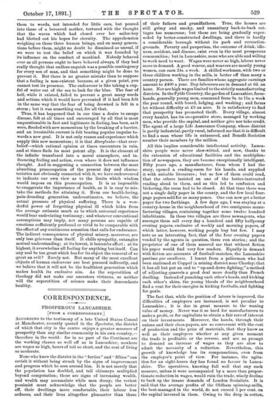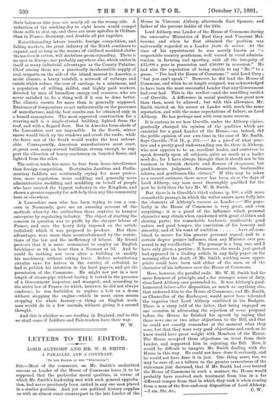CORRESPONDENCE.
PROSPEROUS LANCASHIRE.
FROM A CORRESPONDENT.]
ACCORDING to the testimony of a late United States Consul at Manchester, recently quoted in the Spectator, the district of which that city is the centre enjoys a greater measure of prosperity than any similar community in his own country,— therefore in the world : for in no part of the Continent are the working classes so well off as in Lancashire; nowhere are wages so high, hours of toil so short, and the cost of living so moderate.
None who knew the district in the " forties" and fifties " can 'revisit it without being struck by the signs of improvement and progress which he sees around him. It is not merely that the population has doubled, and tall chimneys multiplied beyond computation; these are signs of increasing wealth, and wealth may accumulate while men decay; the veriest pessimist must acknowledge that the people are better off, their dwellings more comfortable, their labour less arduous, and their lives altogether pleasanter than those of their fathers and grandfathers. True, the houses are still grimy and smoky, and unsanitary back-to-back cot- tages too numerous; but these are being gradually super. seded by better-constructed dwellings, and there is hardly a considerable borough without its park and recreation. grounds. Poverty and pauperism, the outcome of drink, idle- ness, accident, and disease, exist even in the most prosperous communities ; but in Lancashire, none who are able and willing to work need to want. Wages were never so high, labour never more in demand. A good weaver, and weavers are mostly young women, can earn 24s. a week. A skilled workman, with two or three children working in the mills, is better off than many a country parson. There are families whose aggregate earnings amount to £400 a year. Day-labourers are in demand at 6d. an hour. Nor are high wages limited to the strictly manufacturing districts. In the Fylde Country, the garden of Lancashire, farm- hands, generally young men, command from 9s. to Ils. a week the year round, with board, lodging, and washing ; and farms let without difficulty at £3 an acre. It is satisfactory to find that prosperity has promoted thrift. Every village, almost every hamlet, has its co-operative store, managed by working men, who provide the capital, and neither give nor take credit. The agent of a large Life Assurance Company, whose district is partly industrial, partly rural, informed me that it is difficult to find a man whose life is uninsured, and Benefit Societies number their members by the million.
All this implies considerable intellectual activity. Lanca- shire people were never slow-witted, and now, thanks to the extension of educational facilities and the multiplica- tion of newspapers, they are become exceptionally intelligent. Fifty years ago, a manufacturer, from whom I had the story, opened a reading-room for his hands, and supplied it with suitable literature ; but so few of them could read, that the others insisted on one of the better-instructed reading aloud to them, and as this led to confusion and bickering, the room had to be closed. At that time there was not a single daily paper in the county, and the few local four- page papers sold for as many pence. One can now get a better paper for two farthings. A few days ago, I was staying at a country-house in the neighbourhood of two contiguous manu- facturing villages, containing together some twelve hundred inhabitants. In these two villages are three newsagents, who amongst them sell every day a hundred and fifty halfpenny evening papers, exclusive of weekly and morning papers, of which latter, however, working people buy but few. I may note as an interesting fact, that of the four evening papers vended by the agents in question, three run stories ; and the proprietor of one of them assured me that without fiction his paper would find very few readers. Equally in demand with fiction are accounts of football-matches, the Lancashire pastime par excellence. I learnt from a policeman who had been stationed at Coppul (a mining district near Chorley) that it has all but put an end to " up-and-down fighting," a method of adjusting quarrels a good deal more deadly than French duelling. Instead of punching each other's heads, and kicking each other's shins, the young bloods of the neighbourhood find a vent for their energies in kicking footballs, and fighting for goals.
The fact that, while the position of labour is improved, the difficulties of employers are increased, is not peculiar to Lancashire ; it is due in great measure to the waning value of money. Never was it so hard for manufacturers to make a profit, or for capitalists to obtain a fair rate of interest on their investments. Moreover, the hands, through their unions and their class-papers, are so conversant with the cost of production and the price of materials, that they know as well as their employers whether at any given moment the trade is profitable or the reverse, and are as prompt to demand an increase of wages as they are slow to admit the necessity of a redaction. Nevertheless, this growth of knowledge has its compensations, even from the employer's point of view. For instance, the agita.
tion for an eight-hours day has found no favour in Lanca.
shire. The operatives, knowing full well that any such measure, unless it were accompanied by a more than propor.
tionate reduction in wages, would ruin the trade, wisely decline to back up the insane demands of London Socialists. It is said that the average profits of the Oldham spinning-mills, the best-managed in the world, do not exceed 5 per cent. on the capital invested in them. Owing to the drop in cotton, their balances this year are nearly all on the wrong side. A reduction of the working-day to eight hours would compel these mills to shut up, and there are more spindles in Oldham than in France, Germany, and Austria all put together.
Notwithstanding labour trouble, foreign competition, and falling markets, the great industry of the North continues to expand, and so long as the masses of civilised mankind clothe themselves in cotton, will doubtless go on expanding. There is no spot in Europe, nor probably anywhere else, which unites in itself so many industrial advantages as the County Palatine. Chief among these are a practically inexhaustible supply of coal, seaports on the side of the island nearest to America, a moist climate, a heavy rainfall, a network of railways and canals which reduce the cost of carriage to a minimum, and a population of willing, skilful, and highly paid workers, directed by men of boundless energy and resource, who are never satisfied to do a thing well if it can be done better. The climate counts for more than is generally supposed. Extremes of temperature re-act unfavourably on the processes of manufacture, and the best results can be obtained only in a. humid atmosphere. The most approved construction for a weaving-mill is a single-storied building, lighted from the roof, and with a flagged floor. But in America loom-sheds of the Lancashire sort are impossible. In the North, winter snows would block up the windows and crush the roofs; while the fierce sun of the South would render the heat unbear- able. Consequently, American manufacturers must erect, at great cost, many-storied buildings, strong enough to sup- port the vibration of heavy machinery on boarded floors, and lighted from the sides.
The cotton trade has more to fear from home interference than foreign competition. Doctrinaire Jacobins and Parlia- mentary faddists are continually crying for more protec- tion, more regulation, more coddling, and generally more administrative meddling and muddling on behalf of people who have created the biggest industry in the Kingdom, and shown a greater capacity for self-help than any like community here or elsewhere.
A Lancashire man who has been trying to run a con- cern in Normandy, gave me an amusing account of the methods whereby the authorities there contrive to hamper enterprise by regulating industry. The object of starting the concern in question was to profit by the cheaper labour of France, and save the heavy duty imposed on the article (celluloid) which it was proposed to produce. But these advantages were more than counterbalanced by the restric- tions of the law and the inefficiency of labour. My friend protests that it is more economical to employ an English bricklayer at 9d. an hour than a Norman at 3d. And he could do nothing, not even alter a building or modify his machinery, without asking leave. Before substituting circular saws for knives in the cutting of celluloid, he had to publish his intention in the local papers, and get the permission of the Commune. He might not put in a new length of steam-pipe without having it tested in the presence of a Government inspector, and stamped ; and, according to the strict law of France (to which, however, be did not always conform), he was forbidden to replace a belt on a dram without stopping the engine—which in most cases means stopping the whole factory—a thing an English work- man would do in a few seconds, without giving it a second thought.
And this is whither we are tending in England, and to this we shall come if faddists and Fair-traders have their way.
W. W.



































 Previous page
Previous page